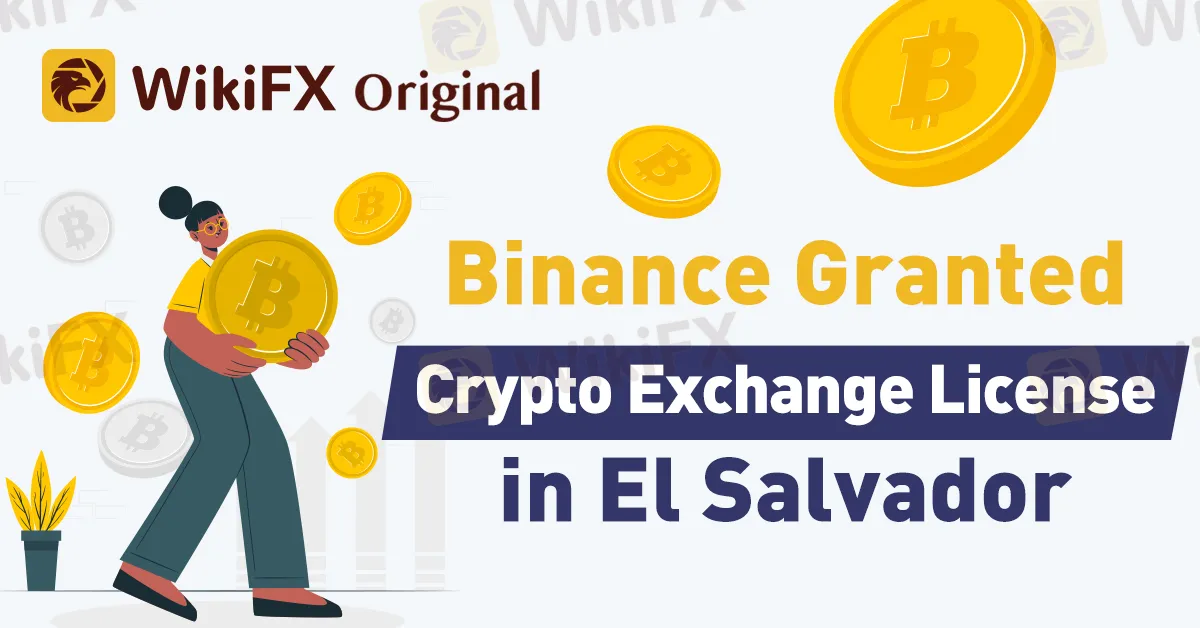简体中文
繁體中文
English
Pусский
日本語
ภาษาไทย
Tiếng Việt
Bahasa Indonesia
Español
हिन्दी
Filippiiniläinen
Français
Deutsch
Português
Türkçe
한국어
العربية
Binance Granted Crypto Exchange License in El Salvador
Abstract:Binance's Expansion in El Salvador: Securing Licenses and Fostering Crypto Adoption Amid Regulatory Developments.

Binance has achieved a significant milestone in its global expansion efforts by securing two licenses in El Salvador, issued by the country's central bank and the regulatory authority overseeing digital assets. This development elevates the count of nations formally recognizing Binance as a cryptocurrency exchange to a total of 18, as affirmed in the company's statement released today (Tuesday).
The Central Bank of El Salvador has bestowed upon Binance the prestigious Bitcoin Services Provider (BSP) license, while the Salvadorian National Commission for Digital Assets has issued the exchange a comprehensive Digital Services Provider (DASP) license, according to an announcement made by the company.
Sharing his thoughts on these regulatory endorsements, Daniel Acosta, Binance's General Manager for Columbia, Central America, and the Caribbean, emphasized the significance of these licenses. Acosta highlighted that they empower Binance to diversify its product and service offerings, tailored to cater to the distinct requirements of their clientele in El Salvador. Moreover, he underlined the pivotal role these licenses play in fostering collaboration with governmental authorities, facilitating the integration of crypto assets within the nation, promoting financial inclusivity, driving innovation, and ensuring customer protection.

Earlier in the year, El Salvador made headlines by granting its inaugural digital asset service license to Bitfinex. This milestone was achieved when Bitfinex Securities received the license, enabling the provision of tokenized securities within the Central American nation. The license provided Bitfinex with the capacity to raise capital through the issuance of tokenized securities, a significant move in the evolving landscape of finance.
El Salvador's groundbreaking move to establish Bitcoin as a legal tender in 2021 marked a historic shift in the global financial landscape. Spearheaded by President Nayib Bukele, this initiative aimed to simplify banking processes for Salvadorans. While the decision drew attention from the International Monetary Fund (IMF) due to Bitcoin's inherent volatility, the country pressed forward with plans to enact comprehensive regulations surrounding digital assets.
In January, Reuters reported that El Salvador had introduced legislation governing the issuance of alternative digital currencies in addition to Bitcoin. Known as the Digital Asset Securities Law (DASL), this legislative framework was designed to attract foreign investors and foster new financial opportunities within the nation.
Furthermore, the newly enacted law encompasses the issuance of Bitcoin-backed bonds, colloquially referred to as 'Volcano Bonds'. These bonds, introduced by the Salvadorian government in 2021, lay the foundation for the construction of a pioneering Bitcoin city within the country—an initiative that has captured attention globally for its innovative approach to urban development.

Disclaimer:
The views in this article only represent the author's personal views, and do not constitute investment advice on this platform. This platform does not guarantee the accuracy, completeness and timeliness of the information in the article, and will not be liable for any loss caused by the use of or reliance on the information in the article.
Read more

Malaysia’s Crypto Landscape: Adapting Amidst Global Ambitions
The United States is intensifying its efforts to become a global cryptocurrency hub under President-elect Donald Trump. Experts believe this move could prompt countries, including Malaysia, to reassess their regulatory approaches toward digital assets.

SEC Approves Hashdex and Franklin Crypto ETFs on Nasdaq
The SEC has approved crypto index ETFs by Hashdex and Franklin Templeton, including Bitcoin and Ethereum, marking a milestone in crypto asset investment.

North Korean Hackers Steal $1.3bn in Cryptocurrency in 2024
Over $2.2bn in cryptocurrency stolen in 2024, with North Korean hackers accounting for $1.3bn. Discover how cyber theft impacts the evolving crypto landscape.

ASIC Sues Binance Australia Derivatives for Misclassifying Retail Clients
ASIC accuses Binance Australia of misclassifying 500+ retail clients as wholesale, denying key consumer protections for crypto derivatives. Penalties and reforms are underway.
WikiFX Broker
Latest News
Geopolitical Events: What They Are & Their Impact?
Top 10 Trading Indicators Every Forex Trader Should Know
ASIC Sues Binance Australia Derivatives for Misclassifying Retail Clients
WikiFX Review: Is FxPro Reliable?
Malaysian-Thai Fraud Syndicate Dismantled, Millions in Losses Reported
Trading frauds topped the list of scams in India- Report Reveals
Why Do You Feel Scared During Trade Execution?
Revolut Leads UK Neobanks in the Digital Banking Revolution
Fusion Markets: Safe Choice or Scam to Avoid?
SEC Approves Hashdex and Franklin Crypto ETFs on Nasdaq
Currency Calculator


